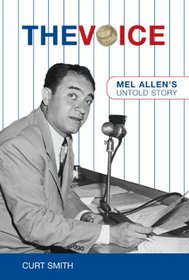The Voice: Mel Allen’s Untold Story
 To post-World War II America, Mel Allen defined sports radio/TV. Variety Magazine called his among “the world’s 25 most recognizable voices.” Daily, Mel aired the New York Yankees: baseball’s gold-standard. Yankee-haters loathed him. Most felt Allen the ultimate broadcast celebrity. Curt Smith’s The Voice: Mel Allen’s Untold Story (The Lyons Press, 2007, 270 pages) tells the saga of a man who had all, lost all, and incredibly, came back.
To post-World War II America, Mel Allen defined sports radio/TV. Variety Magazine called his among “the world’s 25 most recognizable voices.” Daily, Mel aired the New York Yankees: baseball’s gold-standard. Yankee-haters loathed him. Most felt Allen the ultimate broadcast celebrity. Curt Smith’s The Voice: Mel Allen’s Untold Story (The Lyons Press, 2007, 270 pages) tells the saga of a man who had all, lost all, and incredibly, came back.
Mel became the Yankees Voice in 1940. By 1964, he had aired four thousand games, 21 World Series, 24 All-Star Games, 14 Rose Bowls, NBC Radio’s Monitor, and three thousand Twentieth Century Fox newsreels as “your Movietone reporter.” Sixty million heard him weekly. Sports Illustrated termed Mel “the most successful, best-known, highest-paid, most voluble figure in sportscasting, and one of the biggest names in broadcasting generally.”
Then, in late 1964, the Yankees fired Allen near his peak as an institution. Fiction suggested drink, drugs, or breakdown. For the next decade, baseball’s grandest Voice simply ceased to exist, becoming a non-person, for reasons he never grasped. Long-time New York Post columnist (no relation) Maury Allen noted: “No topic caused more reader mail to me than why the Yankees fired Mel.” This is the first book to explain sportscasting’s most mysterious dismissal.
“He gave the Yankees his life,” said Red Barber, “and they broke his heart.” Childless, unmarried, with few to defend him, Mel reacted stoically. In 1976, TV’s new This Week in Baseball had Allen audition. Even at TWIB, many thought him dead. Instead, he forged TV’s highest-rated syndicated sports serial. “For years he was a forgotten man,” said SI, “but it has all come back to him in abundance.” Allen died at 83 in 1996—to the Yankees’ John Sterling, “a Sinatra, or Crosby, or Astaire.” The Voice chronicles a stirring, despairing, then ultimately redeeming life.
